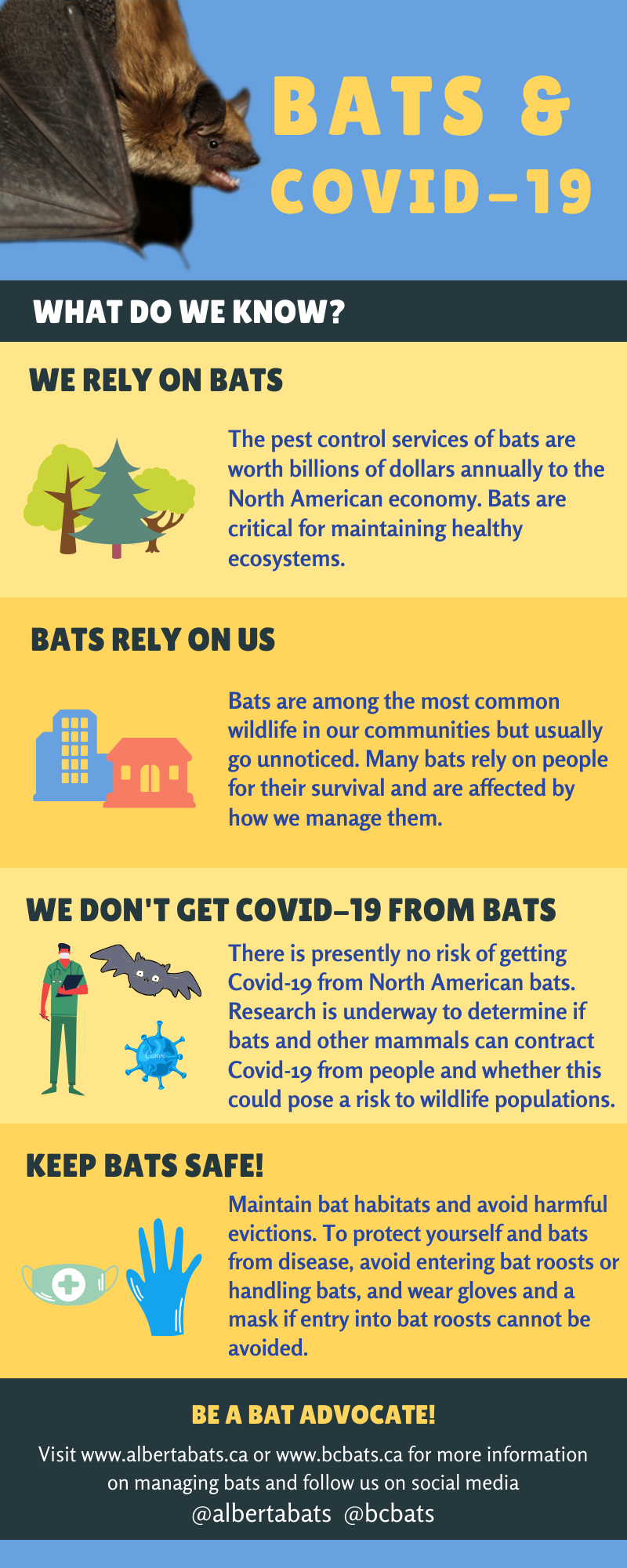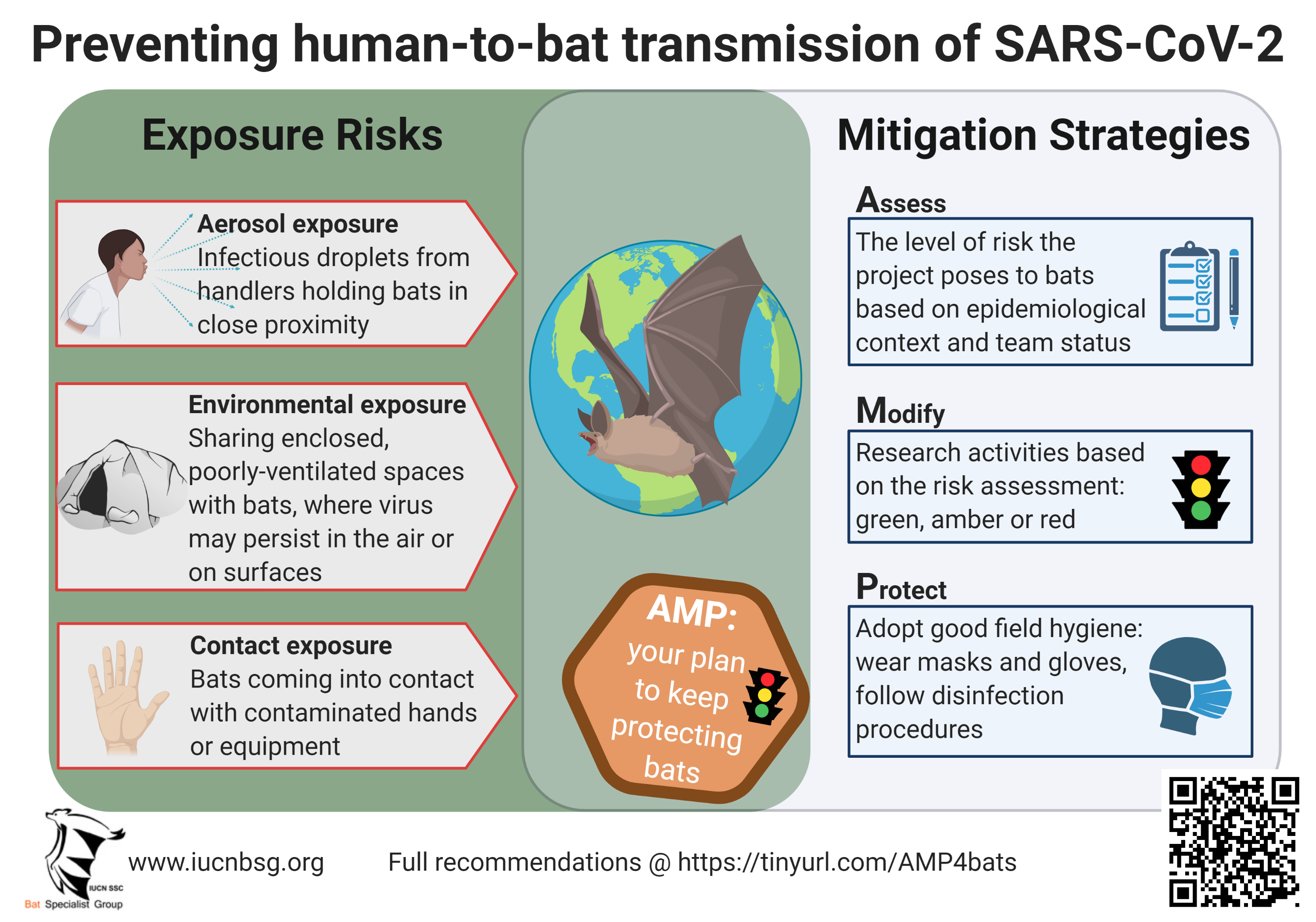The world-wide COVID-19 pandemic is affecting quite literally every facet of life on earth as we know it, and bats are no exception.
Updated July 29, 2021
SARS CoV-2 is the virus that causes COVID-19. It is not found in the North America bat population at present. However, on top of battling the devastating effects of the white-nose syndrome (WNS) fungal disease, bats across Canada and North America may be at risk of contracting the SARS-CoV-2 from humans. In general, bat researchers everywhere are taking precautions to reduce the chance of viral transmission from humans to animals, or spillback, until we know more. The recommendations to avoid spillback into bats are guided by the best available science and are updated regularly by the International Union of Conservation of Nature.
Bats and the Coronavirus:
Bats possess a fascinating ability to live with some viruses and show no clinical signs of disease, while the same viruses cause serious illness in other mammals. This holds true in experimental laboratory tests of highly pathogenic viruses like Ebola virus, Marburg virus, and certain coronaviruses. This ability suggests the bats may hold the key to combating viral infections in humans (Baker et al 2012). University of Saskatoon researcher and WCS Canada research collaborator Dr. Vikram Misra explains that bats keep the viruses in check via their unique immune system. But if a healthy bat is put under stress, its immune system is thrown off balance leading to viral multiplication in the bat and greater potential for viral shedding and subsequently, spillover, or the transmission of a virus between species.

While the horseshoe bats found in China are the likely ancestral host of SARS-CoV-2, we still don’t know how SARS-CoV-2 spilled over from bats into humans and if an intermediate animal host was involved. Two major pathways known to trigger spillover events between wildlife and people are the wildlife trade and environmental degradation. As new data emerge, now more than ever, we are recognizing that human health and planetary health are inter-twined and that wildlife conservation is part of global health solutions.
Impact on Bat research in Canada:
It is suspected that the SARS-CoV-2 virus can be transmitted from humans to North America’s bat population (i.e. spillback). It is still unknown at this time, but if bat populations become a stable reservoir for SARS-CoV-2, they could then potentially pose a risk to recirculating the virus back to humans, and in particular to people who handle bats frequently. This may also be true of other mammal species that SARS-CoV-2 is able to infect and thus researchers are urgently studying which species are susceptible to the virus.
At this time, the IUCN Bat Specialist Group has recommended careful consideration of all field research activities that involves direct interactions with bats, considering local case counts and vaccination status in the evaluation of a project: "AMP"- Assess risk, modify activities based on risk, protect with PPE and disinfection. Bat research in British Columbia is not prohibited, but has been reduced in scope in 2021. The Canadian Wildlife Health Cooperative issued updated official guidance on March 11, 2021 recommending that wild bats be handled only when deemed important for bat conservation in Canada until the risks associated with SARS-CoV-2 are better understood.

Alberta and B.C. have issued recommendations to bat rehabilitation centers to minimize the number of bats submitted for care and to use PPE to prevent exposure to bats.
In the meantime, because spring/summer is a critical time for WNS surveillance, WCS Canada continues to support provincial efforts to sample bat roosts for evidence of the fungus (via guano collection). And the B.C. government is still asking the public to be vigilant of any sick or dead bats and report this to provincial wildlife health departments.
As always, remember:
1. Immediately contact a health care provider if you have come into direct contact with a bat
2. Bats, like all wildlife, can transmit disease to humans.
3. Respect bats from a safe distance; do not handle them unless absolutely necessary.